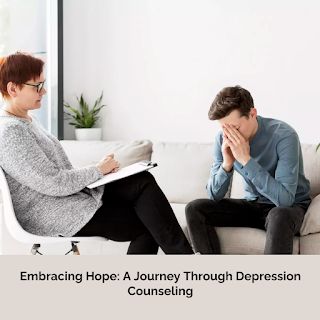Embracing Hope: A Journey Through Depression Counseling
Introduction
Life's journey is often fraught with challenges, and for some, navigating the depths of depression can seem like an insurmountable task. However, there's a beacon of hope in the form of depression counseling, a transformative experience that can guide individuals towards the light. In this article, we will explore the journey through depression counseling and therapy, understanding its nuances, benefits, and how it can pave the way to a brighter tomorrow.
1. Understanding Depression
Depression is more than just feeling sad; it's a complex
emotional state that affects millions. Let's delve into what it means to be in
the clutches of depression and how it manifests in daily life.
2. The Importance of Seeking Help
Breaking the Silence: Understand why seeking help is crucial
in the battle against depression. Discover the courage it takes to reach out
and start the journey towards healing.
3. Role of Professional Counselors
Guiding Lights: Explore the pivotal role professional
counselors play in providing support and insights to those navigating the
turbulent waters of depression.
4. Personalized Approach to Treatment
Tailoring Solutions: One size doesn't fit all in depression
counseling. Learn how a personalized approach ensures effective and meaningful
treatment plans.
5. Unveiling the Stigma Surrounding Depression
Shattering Stereotypes: Addressing the stigma surrounding
depression is a vital step. Let's unravel common misconceptions and encourage a
more empathetic understanding.
6. Techniques in Depression Counseling
Tools for Healing: From cognitive-behavioral therapy to
mindfulness, discover the various techniques employed in depression counseling
and how they bring about positive change.
7. Building Resilience Through Counseling
Fortifying the Mind: Explore how counseling acts as a
resilience-building tool, empowering individuals to face life's challenges with
newfound strength.
8. Integrating Medication and Counseling
Balancing Act: Understand the delicate interplay between
medication and counseling in treating depression, highlighting the importance
of a holistic approach.
9. Nurturing Relationships for Healing
Healing Bonds: Examine the role of supportive relationships
in the healing process and how they contribute to overall well-being.
10. Overcoming Relapses
Bouncing Back: Addressing the reality of relapses in
depression and discovering strategies to overcome setbacks on the path to
recovery.
11. Empowering Self-Care Strategies
Self-Love and Care: Learn about the empowering self-care
strategies that individuals can incorporate into their daily lives to foster
mental well-being.
12. Celebrating Small Victories
Milestones Matter: Understand the significance of
celebrating small victories in the journey through depression, fostering a
positive mindset.
13. The Journey to Inner Peace
Finding Serenity: Explore how the journey through depression
counseling leads individuals towards inner peace, creating a harmonious balance
in life.
14. Fostering a Supportive Community
Community Connection: Delve into the importance of community
support in the healing process and how building connections contributes to a
supportive environment.
15. Embracing Hope: A Personal Testimony
From Darkness to Light: Conclude the journey with a personal
testimony, illustrating how embracing hope can turn the tide in the battle
against depression.
Conclusion
In the realm of depression counseling, hope becomes a
guiding force, leading individuals from the depths of despair to a brighter,
more fulfilling life. As we've explored various facets of this transformative
journey, remember that seeking help is not a sign of weakness but a courageous
step towards healing.
Frequently Asked Questions
1.Can counseling cure depression?
Counseling doesn't cure depression, but it provides valuable
tools and support to manage and overcome it.
2.How long does depression counseling take to show results?
The timeline varies, but individuals often start
experiencing positive changes within a few sessions.
3.Is medication always necessary in depression treatment?
Not always. Counseling alone or a combination of counseling
and medication depends on individual circumstances.
4.Can I engage in self-help strategies alongside counseling?
Absolutely! Self-help strategies complement counseling,
contributing to a holistic approach to mental health.
5.What role do support networks play in depression recovery?
Support networks are crucial. Building connections and
fostering a supportive community greatly aids in the recovery process.



Comments
Post a Comment